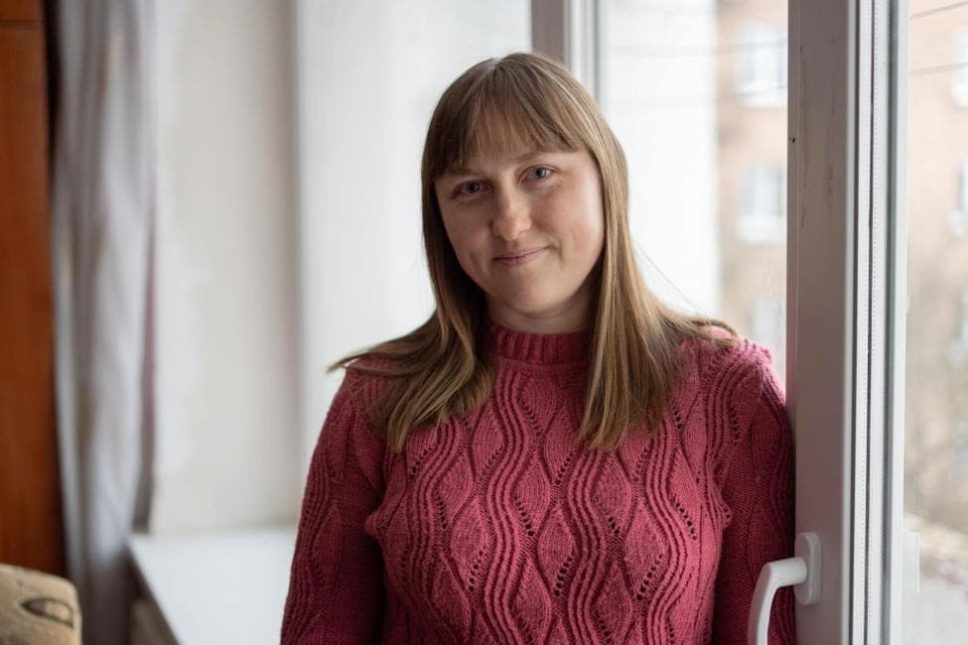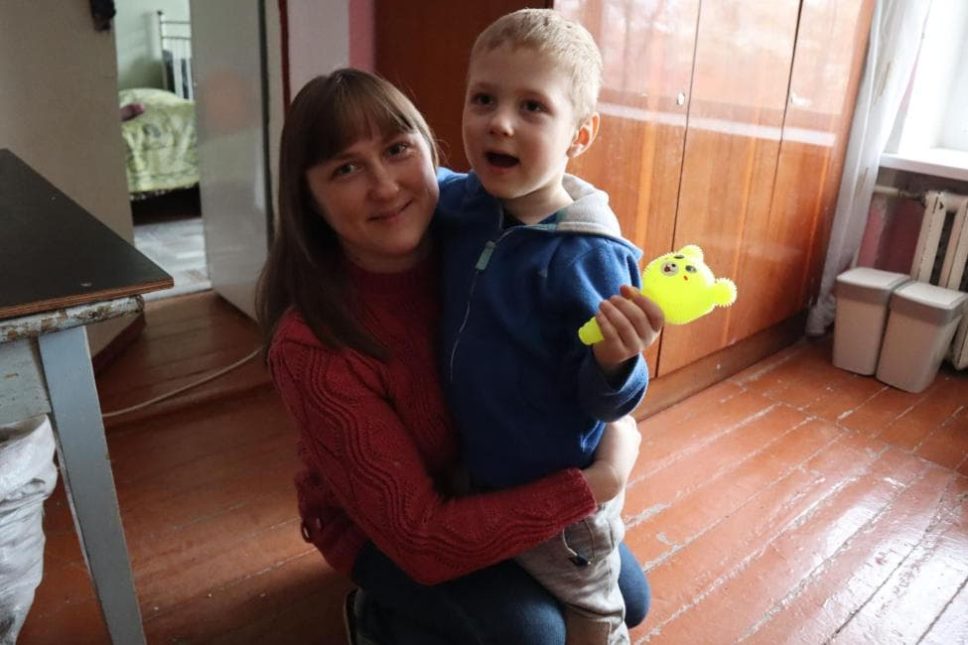
Faith unshattered amidst the war: Yevheniia’s story
09/02/2024
Khmelnytskyi — In the tranquil town of Druzhkivka, in Donetsk region of Ukraine, Yevheniia led a quiet life. With her own apartment and a career as a crane operator, Yevheniia defied gender norms, much like her mother who worked as a welder at the same local machinery plant. But life took a turn when the Russian war on Ukraine got close to her hometown.

Photo: IOM/Anna Tsybko
“My life was peaceful. I’d come home from work, cook, take my son to the playground. In the summer, we would go to the seaside or go foraging in the nearby forest. We had a beautiful life. Since I was 13, I’ve also been singing in a church choir. Now, I don’t sing anymore,” says Yevheniia describing her life in Druzhkivka before the war.
Druzhkivka, once a peaceful town, became a target of constant attacks in early 2022. Yevheniia was fearful for the safety and well-being of her young son, as she faced the harrowing reality of explosions echoing through her once serene town: “One of the rocket attacks targeted our street. A few houses were completely destroyed, as if they were never there. Our house survived but that one across the street folded like a house of cards.”
The fear of encroaching hostilities and a possibility of a siege compelled her to make a difficult decision – to uproot her family and seek refuge elsewhere. With the assistance of volunteers, Yevheniia left behind the familiar streets of Druzhkivka.

Photo: IOM/Maryna Orekhova
“I have a child with special needs and a mother who is sick, I realized that I had to get them out. We left in the morning, one of the stops on the evacuation train was Kramatorsk, just a few hours before the attack on the train station there1. As I found out later, one of my colleagues from the plant was killed there. His name was Tolia.”
The family did not know their final destination at the time, they went into the unknown and ended up finding refuge at a collective centre for displaced people in Shepetivka, located in Khmelnytskyi region of Ukraine. In Shepetivka, Yevheniia now shares a modest room with her son and ailing mother.
“My mother is very sick, it’s a lung disease. She got it from working at the plant. She is getting worse every year. And my son has autism. I am not able to work now, as I am taking care of both of them,” says Yevheniia.
Balancing the care of her son and attending to her mother’s deteriorating health has proven to be a difficult task, causing financial struggles for the young mother taking care of the two generations of her family. Yet, amidst the challenges, Yevheniia’s spirit remains unbroken. In the face of adversity, she clings to the fragments of joy that life still offers.
“I look at life positively. You should always be grateful for what you have. There are always kind people around who will help,” says Yevheniia.
Back at home, Yevheniia found joy singing in a choir of her local church, finding a community and support system. However, she now speaks of it in past tense, as it fell victim to a Russian missile:
“A ballistic missile hit a kindergarten at the corner of our street, only dust remained from it. And our church got destroyed, cracks went down to the foundation, the roof fell.”
The sense of loss is palpable as Yevheniia reflects on the destruction of her church, the shattered community bonds, and the friends and coworkers who have already become casualties of the war. She speaks of the ache for the home she once knew – a place that can no longer offer safety.
“We miss peace. I miss my friends, those who have been killed. My cousin was killed near Bakhmut last March. I miss the peaceful times, when we could just live, make plans for the future, have hopes, everything used to be good.”
Yevheniia’s journey from Druzhkivka to Shepetivka is emblematic of the countless stories of displacement and resilience that have emerged from the war-torn regions of Ukraine. As the world watches the protracted humanitarian crisis, Yevheniia reminds us that hope can endure even in the face of unimaginable adversity.
IOM has supported the collective centre for displaced people, where Yevheniia lives, by installing boilers, providing minor repairs, installing new showers, replacing old doors and windows, as well as providing humanitarian aid kits to its residents, fostering a sense of stability and dignity for individuals, like Yevheniia, navigating the challenges of displacement. The assistance was made possible thanks to the European Union and the United States Agency for International Development.
Anna Tsybko | National Communications Officer
- On April 2022, a Russian missile strike hit the railway station in Kramatorsk, Eastern Ukraine. The strike killed 63 civilians (including 9 children). Russian authorities denied responsibility for the attack. ↩︎
Stories
-
Katarina Mathernova: If Ukraine had a human face and a human spirit, it would be 10-year-old Roman Oleksiv
-
A regional mission to drive social entrepreneurship: the story of Ksenia Kosukha
-
EU restores safe water supply for 100,000 Ukrainians affected by war
-
Promoting IT during the war: Lviv IT cluster and how EU4Digital helps
-
Frontline digitalisation: Kharkiv IT Cluster collaborations
-
How EU4Youth is driving opportunity and success among young Ukrainians